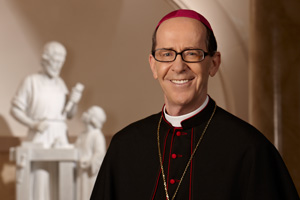
We continue today our consideration of the document that many are calling “Pope Francis’ Game Plan,” namely his apostolic exhortation entitled “The Joy of the Gospel.” While insisting that this document is not an encyclical or a document aimed at defining Church dogma (cf. #184), it is nonetheless an important message of the Successor of Peter in which he exhorts all of us in the Church to embrace the Gospel with confidence and to live it with joy. Today we shall look at what he has to say about marriage and the family.

What is at stake
Prior to being elected to the Chair of St. Peter, Pope Francis, then known as Cardinal Jorge Bergoglio, vigorously defended the definition of marriage when it was legally challenged in Argentina. The heart of his defense was built around sacrifice and prayer. He wrote, for example, to the Carmelite Sisters of Argentina, asking them to fulfill a key role in this effort by wielding the “two invincible weapons of Saint Thérèse,” namely prayer and sacrifice.
In his letter to the Carmelites, he explained why their contribution was so badly needed, precisely when there were efforts underway in Argentina to redefine marriage: “At stake is the identity and survival of the family: father, mother and children. At stake are the lives of many children who will be discriminated against in advance, and deprived of their human development given by a father and a mother and willed by God. At stake is the total rejection of God’s law engraved in our hearts.”
One can readily understand, in light of these strong words written prior to becoming pope, why Francis has called for an Extraordinary General Assembly of the Synod of Bishops, to be held this coming October in Rome, to address the topic of “The Pastoral Challenges of the Family in the Context of Evangelization.”
In the “Joy of the Gospel” (#66), the Holy Father writes: “The family is experiencing a profound cultural crisis, as are all communities and social bonds. In the case of the family, the weakening of these bonds is particularly serious because the family is the fundamental cell of society, where we learn to live with others despite our differences and to belong to one another; it is also the place where parents pass on the faith to their children.”
Threats to the sacredness of marriage
When Pope Francis talks about marriage and the family experiencing “a profound cultural crisis,” what does he have in mind? He sees harmful influence coming from a variety of forces at work in the world today. “Over-exposure to the mass media” is one example that he talks about in “The Joy of the Gospel” (#62): he writes, “…the negative aspects of the media and entertainment industries are threatening traditional values, and in particular the sacredness of marriage and the stability of the family.”
Careful attention to the kind and amount of media entering the home is a very important extension of parents’ responsibility to be the first educators of their children. I know a married couple who decided to remove the television signal from their home in favor of forms of entertainment and information that were more parent-controllable. This is how the father explained their decision: “We realized when our first son was 1 year old and completely absorbed in whatever the TV was showing, especially commercials, that our biggest rival in teaching him the meaning of life was the TV. In essence, we were inviting a series of teachers into our home without checking their credentials and by our passivity allowing them to be formatters of our son. Switching to the DVD-only entertainment changed things. I missed March Madness, but I knew I would regret forever letting the media be our son’s primary educator. That was one of the best educational decision my wife and I have made.”
Another harmful influence is a popular idea today that sees marriage as (#66) “a form of mere emotional satisfaction that can be constructed in any way or modified at will.” Lost in such an erroneous idea is God’s plan for marriage and an appreciation of the contribution to the stability of the family and of society that is made by lifelong marriage vows.
[quote_box_right]
Pope Francis’ Game Plan
Read more columns from this series by Bishop Olmsted.
[/quote_box_right]
A third problem stems from individualism which is so widespread in industrialized societies. In this regard, the Holy Father writes (#67), “The individualism of our postmodern and globalized era favors a lifestyle which weakens the development and stability of personal relationships and distorts family bonds.” The heart of Christian morality is found in Jesus’ words, “Love one another as I have loved you.” Individualism runs directly contrary to this focus on the good of the other.
‘No’ to sterile pessimism
It is evident that Pope Francis is no stranger to the many difficulties faced by married couples today. Having lived and served as a bishop, not from an ivory tower or within the strict confines of office and rectory but in close collaboration with the poor and with those negatively impacted by the breakdown of the family, Pope Francis knows firsthand the depths of the crisis faced by married couples today. He has nonetheless insisted that the vocation of married couples, and indeed of every disciple of Jesus, is built on the solid foundation of Christian faith and hope. He writes (#84), “The evils of our world — and those of the Church — must not be excuses for diminishing our commitment and our fervor. Let us look upon them as challenges which can help us to grow. With the eyes of faith, we can see the light which the Holy Spirit always radiates in the midst of darkness, never forgetting that ‘where sin increased, grace has abounded all the more’ (Rom 5:20).”
Gospel joy holds within it a power to overcome pessimism. It strengthens our hope in God, even as we humbly confess our sins and rely on the riches of divine mercy. In this regard, Pope Francis continues (#85), “While painfully aware of our own frailties, we have to march on without giving in, keeping in mind what the Lord said to St. Paul: ‘My grace is sufficient for you for my power is made perfect in weakness’ (2 Cor 12:9).”
Next time, I shall offer further reflections on other key aspects of Pope Francis’ game plan. This plan, which focuses on the joy of following Christ, also deals with issues that are vitally important for the Church today. It is indeed worthwhile to take time to read “The Joy of the Gospel” and to study it carefully.





![[VIDEO] Make Sunday feel like Sunday again](https://www.catholicsun.org/wp-content/uploads/2021/04/2021-YOUTUBE-BISHOP-MESSAGE-THUMBNAIL-ENGLISH-218x150.png)